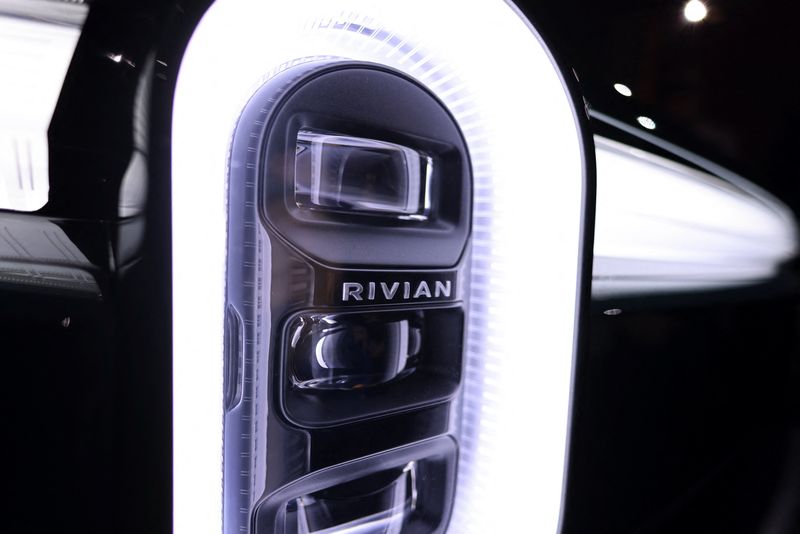BERLIN/FRANKFURT (Reuters) - Volkswagen (ETR:VOWG_p), Europe's biggest carmaker, plans to spend as much as $5 billion on an electric vehicle (EV) software partnership with U.S.-based Rivian (NASDAQ:RIVN).
Here are some of the key issues around the deal:
WHY IS VOLKSWAGEN DOING THIS?
The tie-up is the latest in a string of deals by Volkswagen Chief Executive Oliver Blume, who took over in September 2022 after the ousting of Herbert Diess.
Shifting from combustion engine to electric cars requires expertise in areas where historically Volkswagen has little experience, from charging to batteries to software.
Diess set up software unit Cariad in 2020, hoping to develop a tech culture to rival Tesla (NASDAQ:TSLA)'s.
It hasn't worked, with delays and losses plaguing the unit, a failure analysts have blamed partly on the group's sprawling management and slow decision-making.
Blume is looking outwards for a fix, doing deals with Xpeng (NYSE:XPEV) in China and now Rivian in the United States to tap software expertise from EV-only startups that have developed the technology from a clean slate.
WHAT DO THE PARTNERS BRING TO THE TABLE?
Volkswagen brings scale, and funds. The money it's putting up allows Rivian to develop more models and cut operating costs by leveraging volume.
Rivian brings its intellectual property on software, which will go into both Rivian cars like the R2 and, later on, Volkswagen Group cars from brands including Audi and Porsche to the revived Scout brand.
The first cars to have the full Rivian stack - software, central computer and wiring - are to hit the road from 2028. But it might be possible to incorporate parts of the technology into earlier models. Rivian has already tested components from Audi to see how they can be combined with its technology.
WHAT'S THE DEAL STRUCTURE?
Broadly speaking, the deal has two elements.
One is a planned 50:50 joint venture (JV) between Volkswagen and Rivian to develop state-of-the-art EV software. Volkswagen will invest up to $2 billion into the JV, half at the end of 2024 and the rest at the end of 2026. The investments will be made via direct equity and loan agreements.
The other element is Volkswagen directly investing up to $3 billion in Rivian, to be spread evenly over 2024-2026. While the first tranche will be via a mandatory convertible note in 2024, the other two are tied to undisclosed financial and technological milestones in subsequent years.
Based on Rivian's current market value, a $3 billion investment would get Volkswagen a 25% stake in the U.S. company, moving it ahead of current top shareholder Amazon (NASDAQ:AMZN).
IS THIS THE END OF CARIAD?
Possibly - at least in its current form.
Asked about Cariad, Blume said it had a "big role" for Volkswagen, calling the Rivian deal a "supplement" to boost the existing software strategy.
Cariad boss Peter Bosch said the partnership would speed up Cariad's work and lower costs.
But responsibility for the so-called '2.0 architecture' of the 'software-defined vehicle' - a major software overhaul to unify operating systems across the Volkswagen group - now sits in the JV.
That leaves a lot less on the unit's plate, raising questions about how long it will continue as a standalone entity.
IS THIS A DE-RISKING MOVE BY VOLKSWAGEN?
In part, yes.
Volkswagen has done a similar deal with Xpeng in China, as part of its strategy to make its business there self-sustainable as global trade tensions rise.
Volkswagen said the Rivian software could technically be rolled out anywhere in the world, but nothing's decided yet.
In addition, the deal strengthens Volkswagen's ties with the United States, where the carmaker is aiming to double market share by 2030 as a potential counterweight to China, its biggest single market.
ARE INVESTORS HAPPY?
Not yet.
Volkswagen's shares fell following the announcement, with analysts noting the high investment that has led the company to cut its net cash flow guidance for its automotive division to 2.5-4.5 billion euros ($2.7-$4.8 billion) from 4.5-6.5 billion.
Some analysts have also warned it could be hard to integrate Rivian's fast-paced startup culture with Volkswagen's multi-brand structure, which is considered slower and more rigid.

Others, including brokerage Stifel, say the group should sell assets to simplify rather than buy them, citing the group's majority holding in truck division Traton.
($1 = 0.9349 euros)